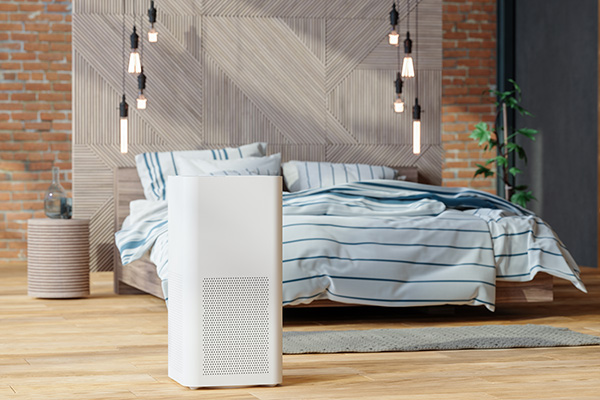Air purifiers are becoming increasingly popular as more and more people understand the importance of clean air in their homes. With so many models, brands, and types available on the market, knowing which is right for you can be challenging. Selecting the right unit for your needs can take some time and effort. Fortunately, there are a few key factors that you can consider when selecting an air purifier for your home. With these factors in mind, you can choose an air purifier that meets all of your needs and provides optimal filtration performance.
1. Consider the Size of the Room
Air purifiers come in different sizes, with varying levels of power and coverage area. You’ll want to pick one that can handle the size of your living space. A unit must be big enough for the space to operate efficiently. Conversely, if the chosen model is too small for your needs, it may struggle with larger rooms or spaces where more pollutants need filtering out.
Considering the size of a room is especially important for larger homes or open-concept spaces, as the cleaner needs to cover the entire space adequately. You also need to consider any potential obstructions, such as furniture. Also crucial to take into account is whether you intend to use the air purifier in multiple rooms, in which case you’ll need to factor in the coverage between spaces. Lastly, look into any special features the air purifier may have, such as adjustable speeds or a timer.
2. Choose an Air Purifier With Multiple Filters
Multiple filter systems provide enhanced protection against airborne particles like dust, pollen, pet dander, mold spores, smoke particles, and more. When selecting an air purifier, consider pre-filter and HEPA filter products. The pre-filter traps larger particles like pet hair, while the HEPA filter captures smaller particles.
For homes with smoke concerns, look for an air purifier with a carbon filter to capture odors and gases. By having multiple layers of filtration working together in harmony, these systems can capture even smaller particles than single-stage units can.
3. Consider the Noise Level
Some units can be loud or disruptive if you’re trying to sleep or concentrate. If noise is a concern for you, choose a unit with a low noise level. Not only can a loud air purifier be disruptive and annoying, but it can also reduce your overall sleep quality. Additionally, some air purifiers have sound-reducing features such as silencers or fans that can further reduce operating noise.
4. Consider the Flow Rate
The flow rate of air refers to the number of particles and gases that flow through a given area over time. This can help to determine how much air will move in or out of your HVAC system. It’s essential to keep track of and maintain the airflow rate in your HVAC system to ensure that it’s efficient and has enough air passing through it.
An easy way to do this is to measure the pressure drop across a filter or other device connected to the HVAC system, as this can indicate the flow rate. If there’s too much of a pressure drop, your HVAC system may be unable to keep up with the demand and will have to work harder.
5. Look for an Energy-Efficient Model
If you’re looking to save money on your energy bill, you’ll want to choose an energy-efficient air purifier. Many newer models use less energy than older models, so this is something to remember when making a decision. Additionally, check out the MERV ratings of your air purifier to see how it compares against other models.
The higher the rating, the more efficient it’s likely to be. Finally, regularly clean or replace your filters for an energy-efficient HVAC system that lasts long and runs smoothly.
6. Choose a Unit With Automatic Settings
Some air purifiers have automatic settings that allow them to adjust their speed based on the room’s needs. This can be helpful if you have allergies or other sensitivities, as it ensures that the unit works at its highest setting when required but doesn’t waste energy when it’s not needed.
It can also reduce the maintenance required on your HVAC system, as it will automatically adjust its settings when needed – although routine HVAC maintenance is still highly recommended. Automatic settings are especially beneficial in rooms with higher levels of dust, pollen, and other allergens that require more frequent filtration.

7. Check the Energy Star Logo
Energy Star is a widely recognized symbol that signifies products that meet specific energy efficiency criteria set by the U.S. Environmental Protection Agency (EPA). By choosing an HVAC system with the Energy Star logo, customers can save up to 10% on their energy bills while reducing their carbon footprint.
8. Consider the Warranty
When it comes to HVAC system maintenance, it’s essential to consider the warranty and return policy. This is especially true for the two main components of an HVAC system: particles and gases. Particle filtration is crucial for improving indoor air quality and reducing health risks. However, filters can clog up quickly, leading to decreased system performance and severe damage if left unchecked. Warranty coverage can provide a safety net if your system fails due to clogged filters or other issues.
As for gases, proper installation and maintenance are crucial for safety, and a warranty can help with unexpected system failures or leaks. Understanding the manufacturer’s warranty and return policy can help you to make informed decisions and ensure optimal system performance and safety. It’s essential to read the terms and conditions carefully, consult with HVAC professionals, and keep up with routine system maintenance to maximize the benefits of your warranty coverage.
9. Look at the Price
Air purifiers can range in price from around $50 to over $1,000. You need to consider how much the unit costs upfront and how much it will cost in terms of energy and replacement filters over its lifetime. Knowing what kind of air purification technology your home needs can help to narrow down your choices and save you money in the long run.
In summary, when choosing an air purifier for your home, it’s essential to consider the size of the room you’re trying to clean. If you’re dealing with particles like dust or pet dander, a HEPA filter air purifier is the best choice. On the other hand, if you need to remove gases and odors, an activated carbon filter will be more effective. Ultimately, it’s essential to research the product specifications of different air purifiers to ensure they meet your needs.
Contact F.F. Hitchcock Plumbing, Heating & Cooling for assistance with deciding on the right air purifier for your home in Cheshire, CT. You can also consider some of our other services, such as getting a humidifier or an air filtration system installed to help keep your home’s air clean and healthy. We can help with a home energy audit. Our team also handles furnace repair, AC repair, heating installation, cooling replacement, and maintenance services in addition to plumbing services and fuel services.







